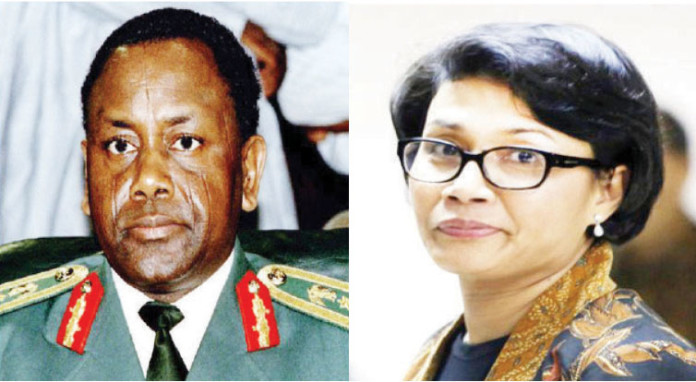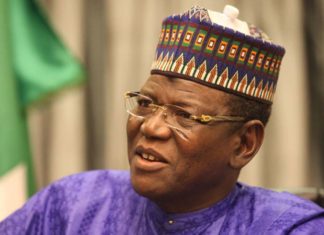World Bank’s pledge to help Nigeria recover $320 million Abacha loot in Swiss banks may be one more dividend of President Muhammadu Buhari’s tours and anti-corruption activism humanity expects from institutions like the World Bank, writes Correspondent SAM NWOKORO.
President Muhammadu Buhari last week played host to Managing Director and Chief Operating Officer of World Bank, Sri Mulyani Indrawati, at Aso Rock. They held discussions on the Nigerian economy. According to a release from the Presidency, Buhari pointedly asked his guest to help Nigeria retrieve much of its money from Swiss banks, especially the $320 million said to have been stashed away by the late General Sani Abacha.
The President said recovering the money could help ease the current hardship in the country.
Buhari said: “We need the support of the World Bank in the repatriation of the funds. We are as concerned as the World Bank about accountability. If such repatriated funds had been misapplied in the past, I assure you that the same will not happen with us. Three hundred and twenty million dollars is a lot of money and we will not allow it to be misappropriated or diverted.”
Repatriation of looted funds has been a burning issue on the public domain for quite a reasonable time now. Retrieving those stolen by former military rulers that ruled Nigeria from 1984 to the return of democratic government in Nigeria had been problematic, with many conditions attached to them by those foreign countries, especially in Americas and Europe, where much of those funds were hidden. Those countries, like Switzerland, had often placed various kinds of requirements, both legal and extra-legal, for Nigeria to fulfil in order to merit their co-operation in the loot recovery.
Hurdles
One of the conditions given by the Swiss authorities for co-operating with Nigeria in recovering the funds is that the money should be expended on the implementation of social programmes for the benefit of the Nigerian people in an efficient and accountable way, to be monitored by the World Bank.
Early in February this year, when authorities in Switzerland made this requirement known, many Nigerian mainstream media reasoned that such directive from a foreign country smacked of diplomatic gaffe. A particular national daily had in its editorial: “We deem the demand by Swiss authorities on Nigeria to disclose what to do with recovered loot from the country insulting, rude and uncouth and goes against the grain of sovereign principles.”
However, it is not only the Swiss authorities that had made similar demand on Nigerian authorities as condition for their co-operation in loot recovery. The United States, Britain, France and other countries, whose banks also harbour Nigeria’s looted funds, have made similar request, albeit veiled. This can be seen in the series of legal agreements signed by Nigeria’s justice ministry and the anti-corruption institutions, with the involvement of the judicial system of those countries. Some of these agreements contained clauses that explicitly demanded Nigerian governments hunting for looted funds to undertake sundry liabilities and cumbersome clearance processes, especially through their justice departments, before those loots could be returned or before accessing the co-operation of anti-graft institutions of those countries.
TheNiche discovered that some of these conditions and legal processes had been ongoing since 2005. Some were concluded before the exit of the Goodluck Jonathan administration, though those monies could not be released to the past government before its exit last year.
In his response, Indrawati told Buhari that the premier global finance house was willing to use its expertise and resources to help Nigeria achieve faster growth and development.
“We will strongly support you to create jobs and ensure prosperity in Nigeria,” she added.
Utilising the loot
There is widespread suspicion among Nigerians that recovered loots are hardly ever utilised for any purpose. The general feeling is that a government that recovers any loot which the previous administration failed to recover ends up mismanaging or re-looting same by not streaming such recoveries into budget plans. In most parts of Africa where political corruption is endemic, foreign partners and development agencies who advance various loans and grants to African dictatorial regimes, especially military, and those without strong anti-corruption institutions have in recent times been finding it difficult to advance such without effective checks against abuse and misapplication of funds. They now want funds requested, whether as loans or grants, to be tailored towards specific areas of problems to be solved, in line with the United Nations several poverty eradication protocols.
The UN has been pursuing several poverty eradication programmes backed by protocols and conventions binding on all member nations.
Joseph Stiglitz, a United States Professor of Economics, who was among the seven scholars that drafted the UN Millennium Development Goals (MDGs) and Sustainable Development Goals (SDGs) protocols and mechanism for eradicating poverty in the world by 2050, or at least half it by 2030, explained that the new insistence by countries harbouring looted funds, especially from third world countries, should not be seen as infringing on sovereign immunity, but that such was in the interest of their own people.
“Strong checks are needed in the efforts at checking political corruption by co-operating partners at global level, so that people’s funds recovered are not diverted to wasteful purposes or again re-looted,” he submitted at the UN World Development Forum held New York in 2012.
Buhari needs the loot
If there is any government in the world today that is in dire need of recovered funds to augment its fiscal plans, it obviously is the President of Nigeria. In Nigeria and the world at large, series of unanticipated development seemed to virtually castrate all his plans to develop the country further from where his predecessors left off. The reliance on black gold has been haunting the Nigerian economy, with crude oil selling at an average of $34 since he assumed power almost one year ago. The resultant exchange rate volatility has also impacted on his fiscal calculations, slowing vibrant economic activities and disorganising everything about Budget 2016 implementation.
Besides, the budget had promised implementation of various shapes of social welfare scheme for the poor. Though controversies had raged over the capability of the Buhari government to successfully implement this scheme, the administration has not totally ruled out implementation of the scheme.
Again, the Buhari government plans to rejuvenate the refineries and make petrol affordable as well as finish critical infrastructural projects. All these make the cry by Buhari for co-operation in retrieving Nigeria’s stolen funds worth lending a helping hand.











